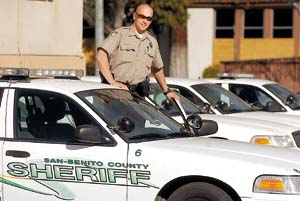Being a rookie is never easy, but in some professions, such as
law enforcement, proper on-the-job training can mean the difference
between life and death.
Being a rookie is never easy, but in some professions, such as law enforcement, proper on-the-job training can mean the difference between life and death.
“Safety is one of the things we stress,” said George Ramirez, a field training officer with the Hollister Police Department. “If new officers have a problem writing a report or issuing a ticket, we can fix it, but if they make a mistake with safety, it could be their last.”
Peace officer training is extensive. Officers must first take an 800-plus hour training course certified by the state Commission on Peace Officer Standards and Training and then complete at least 10 weeks of on-the-job schooling with a field training officer. Both the San Benito County Sheriff’s Department and the Hollister Police Department, however, require 16 weeks for newbie cops.
“It’s designed to take the officer from the classroom in the academy to the real job setting,” Ramirez said. “It’s absolutely vital.”
William Jurevich, a 21-year-old rookie with the Sheriff’s Office, is learning that every day. Jurevich, a Hollister native, has been on the job for 12 weeks but he’s still learning new things.
“I thought I had a pretty good grasp on everything after the academy,” he said. “But when I got here, it was like the first day at the academy all over again – reading a book and doing something hands-on are two different things.”
Both the police and sheriff’s department have one rookie on staff, and it’s likely to stay that way for at least another two years. Sheriff Curtis Hill said it usually takes about that long for a deputy to drop the rookie label. While rookies may make mistakes, neither agency has had any serious incidents or injuries due to a newbie’s mistake.
Another thing Ramirez and other FTOs throughout the county emphasize is the importance of leaving work at the office at the end of the day.
“We tell new officers to dissociate from the job when they’re not at work,” he said. “It’s crucial for your well-being because of the nature of the job, the things we have to deal with and the amount of stress.”
Hollister Police Chief Jeff Miller said one thing he learned 27 years ago as a rookie is that humor is often the best stress reliever.
“One way to deal with stress is to learn to laugh, to find humor in the job,” he said. “And for me, good support at home helps, and a strong Christian faith is also important.”
FTO Deputy Roy Iler knows that being a rookie can be stressful, so when he’s helping to train Jurevich he focuses on giving advice rather than criticism.
“I try not to embarrass him. When we go to a call I don’t want anyone to know he’s new, I just let him fumble around and then we talk about it later,” Iler said. “But, of course, if it becomes a safety issue, I’m going to step in.”
During his training, Jurevich has learned everything from when to pull out his gun and how to write a report, to how best to deal with uncooperative criminals. But many more lessons will come with experience.
Sometimes, the best way to learn is by making a mistake. Ramirez frequently tells new recruits about one of the mistakes he made as a reserve police officer 10 years ago. At the time, Ramirez had only been on the job for a few weeks and was told to transport a female prisoner to the county jail. However, he failed to put her handcuffs on tight enough.
“When I got to the jail, she handed me the cuffs and said ‘You can have these back,'” Ramirez said. “But I’ve learned from that and I share it with others so they can learn from it, too.”
Every rookie deputy and officer makes errors, but the trick is learning from them, Sheriff Curtis Hill said. Thirty years ago, when Hill was a deputy, he wasn’t the best driver. Once, after getting an in-progress call on Highway 25, Hill jumped in his patrol car, which he had only driven two or three times, but failed to make it to the scene.
“I didn’t even get close – I got stuck in the mud and a sergeant had to pull me out,” Hill said. “But the thing is you have to get back in there and do it a little better the next time.”
And Jurevich is beginning to understand just that.
“You’re always learning,” he said.
Brett Rowland covers public safety for the Free Lance. He can be reached at 831-637-5566 ext. 330 or br******@***********ws.com.









